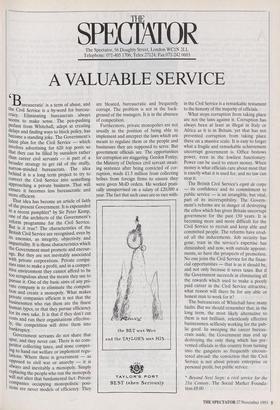SPECT ral AT OR
The Spectator, 56 Doughty Street, London WC1N 2LL Telephone: 071-405 1706; Telex 27124; Fax 071-242 0603
A VALUABLE SERVICE
Bureaucratic' is a term of abuse, and the Civil Service is a by-word for bureau- cracy. Eliminating bureaucrats always seems to make sense. The pen-pushing pedant from Whitehall, adept at creating delays and finding ways to block policy, has become a standing joke. The Government's latest plan for the Civil Service — which involves advertising for 620 top posts so that they can be filled by outsiders rather than career civil servants — is part of a broader strategy to get rid of the stuffy, narrow-minded bureaucrats. The idea behind it is a long term project to try to convert the Civil Service into something approaching a private business. That will ensure it becomes less bureaucratic and more efficient.
That idea has become an article of faith of the present Government. It is expounded In a recent pamphlet* by Sir Peter Kemp, one of the architects of the Government's reform programme for the Civil Service. But is it true? The characteristics of the British Civil Service are recognised, even by its enemies, as integrity, objectivity and impartiality. It is those characteristics which the Government must promote and encour- age. But they are not inevitably associated with private corporations. Private compa- nies exist to make a profit, and in a compet- itive environment they cannot afford to be too scrupulous about the means they use to pursue it. One of the basic aims of any pri- vate company is to eliminate the competi- tion and create a monopoly. What makes private companies efficient is not that the businessmen who run them are the finest human types, or that they pursue efficiency for its own sake. It is that if they don't cut costs and run their organisations effective- ly, the competition will drive them into bankruptcy.
Government servants do not share that spur, and they never can. There is no com- petitor collecting taxes, and none compet- ing to hand out welfare or implement regu- lations. Where there is government — as opposed to civil war or anarchy — it is always and inevitably a monopoly. Simply replacing the people who run the monopoly will not alter that fundamental fact. Private companies occupying monopolistic posi- tions are never models of efficiency. They are bloated, bureaucratic and frequently corrupt. The problem is not in the back- ground of the managers. It is in the absence of competition.
Furthermore, private monopolies are not usually in the position of being able to implement and interpret the laws which are meant to regulate them or the people and businesses they are supposed to serve, But government officials are. The opportunities for corruption are staggering. Gordon Foxley, the Ministry of Defence civil servant await- ing sentence after being convicted of cor- ruption, made £1.5 million from collecting bribes from foreign firms to ensure they were given MoD orders. He worked prati- cally unsupervised on a salary of £20,000 a year. The fact that such cases are so rare with-
in the Civil Service is a remarkable testament to the honesty of the majority of officials.
What stops corruption from taking place are not the laws against it. Corruption has always been at least as illegal in Italy or Africa as it is in Britain, yet that has not prevented corruption from taking place there on a massive scale. It is easy to forget what a fragile and remarkable achievement uncorrupt government is. Office bestows power, even in the lowliest functionary. Power can be used to extort money. When money is what officials care about most that is exactly what it is used for, and no law can stop it.
The British Civil Service's esprit de corps — its confidence and its commitment to public service — is an intangible, but vital, part of its incorruptibility. The Govern- ment's reforms are in danger of destroying the ethos which has given Britain uncorrupt government for the past 150 years. It is becoming more and more difficult for the Civil Service to recruit and keep able and committed people. The reforms have erod- ed all the inducements. Job security has gone; trust in the service's expertise has diminished; and now, with outside appoint- ments, so have the prospects of promotion. No one joins the Civil Service for the finan- cial opportunities — that is as it should be, and not only because it saves taxes. But if the Government succeeds in eliminating all the rewards which used to make a poorly paid career in the Civil Service attractive, what reason will there be for any able or honest man to work for it?
The bureaucrats of Whitehall have many faults. But we should remember that, in the long term, the most likely alternative to them is not brilliant, relentlessly effective businessmen selflessly working for the pub- lic good. In sweeping the career bureau- crats aside, the Government may end up destroying the only thing which has pre- vented officials in this country from turning into the gangsters so frequently encoun- tered abroad: the conviction that the Civil Service is not about private enterprise or personal profit, but public service.
* Beyond Next Steps: a civil service for the 21st Century, The Social Market Founda- tion £8.00










































































 Previous page
Previous page